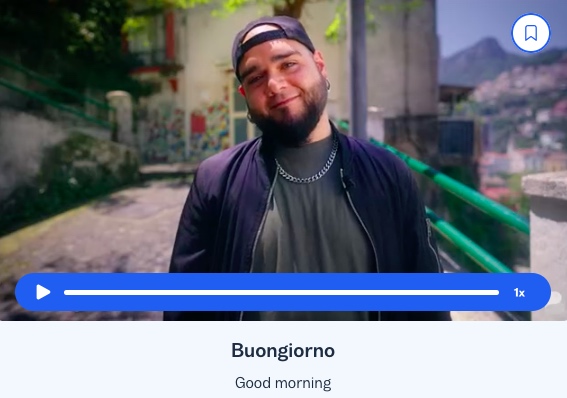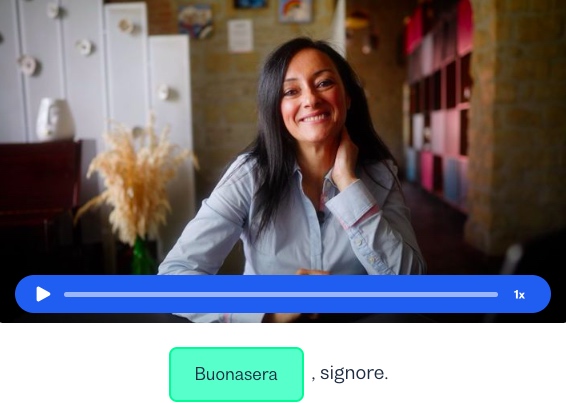50 Basic Italian Phrases
Learn the most useful words and phrases when traveling to Italy
I want to learn...
Even if you never studied Italian in your life you probably already know a few words like ciao, pasta or pizza, so your basic needs are already covered the next time you will be traveling to Italy. Italians are also friendly, welcoming and used to foreign tourists wandering around most cities and they would not mind helping you if you are struggling to understand.
That being said, knowing a few Italian words will allow you to have a whole different experience and even connect with locals when you are visiting for tourism, or planning your next business trip.
Here you will find 50+ useful words, from those you would use literally every day to those it just makes sense to know. Be sure to read until the end and don’t miss the “Better to know them and not need them than need them and not know them” section. It will be helpful.
Phrases you will use literally every day (formal edition)
Let’s start from the basics: you are entering a store, a restaurant, you bump into someone, you need to reach the exit on a crowded bus boat in Venice and you say… one of the words on our first list. Keep in mind that these are the formal versions of these phrases.
Italian, in fact, has a formal and an informal register that differ in a few ways. When in doubt you should always go with the formal version and it also makes sense to be able to recognize these, so you’ll know if you are being addressed in a formal or informal way.
Still, you shouldn’t worry about offending anyone even if you make a mistake. Most times Italians will be happy to follow your lead and switch to informal.
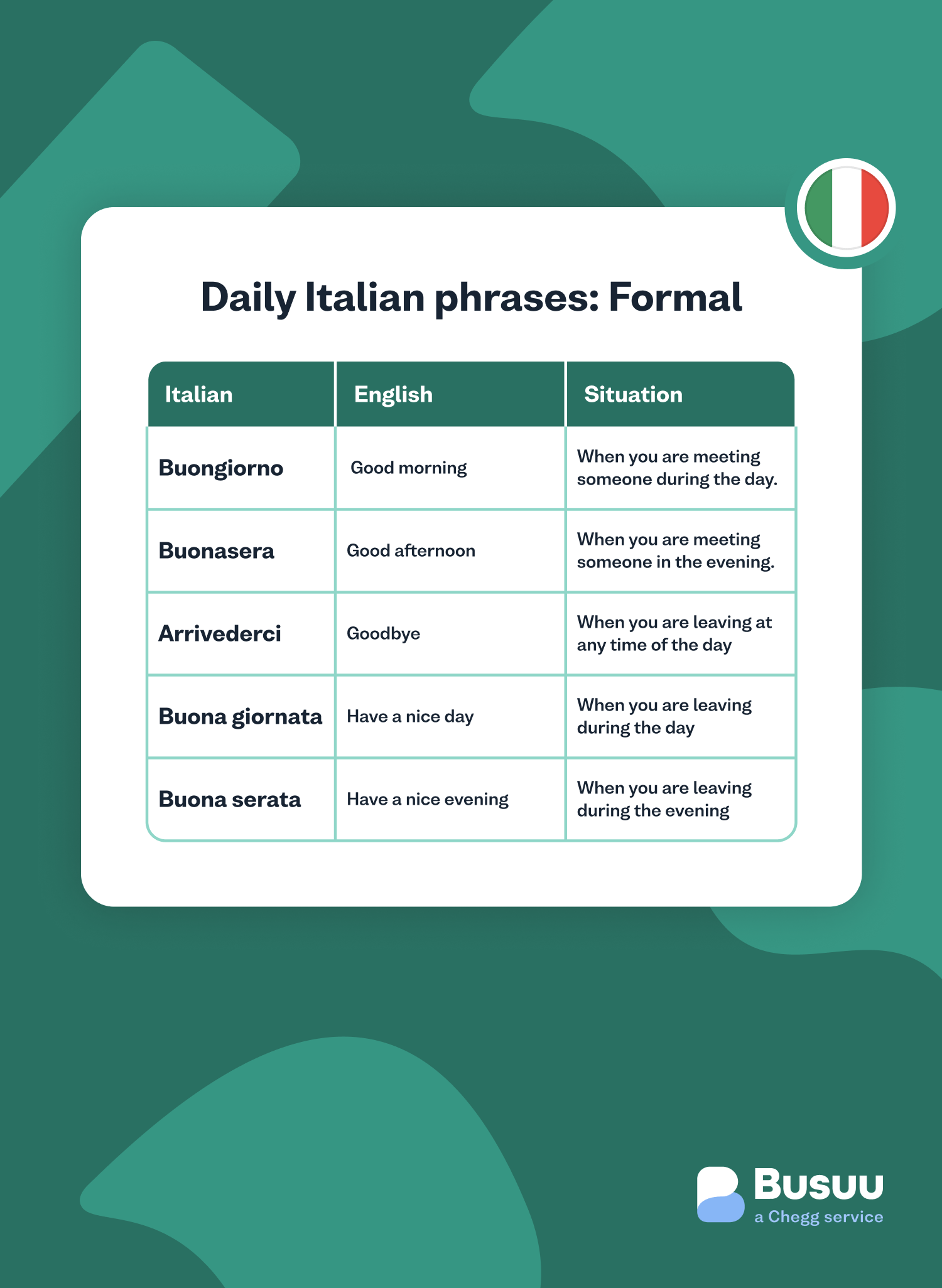
Daily Italian phrases: Formal
| Italian | English | Situation |
|---|---|---|
| Buongiorno | Good morning | When you are meeting someone during the day. |
| Buonasera | Good afternoon | When you are meeting someone in the evening. |
| Arrivederci | Goodbye | When you are leaving at any time of the day |
| Buona giornata | Have a nice day | When you are leaving during the day |
| Buona serata | Have a nice evening | When you are leaving during the evening |
| Grazie | Thank you | When you are thanking someone |
| Prego | You’re welcome | When you are responding to a thank you and in a number of situations |
| Scusi | Excuse me | When you want to apologize or when you want to call for someone’s attention |
| Mi dica | Tell me / How can I help you? | You’ll hear this when you will address someone |
There is no right time to switch from buongiorno to buonasera but generally it is around 6pm. On the other hand if you want to wish a good rest of the day, you would use buona giornata and buona serata.
Prego is a rather flexible word. Apart from translating “you’re welcome” it’s used in a wide array of situations: it could mean “have a seat” or “you first” or even “help yourself” in a buffet. Basically, if you are motioning to someone to move in a kind and thoughtful way, you would say prego.
Scusi can also be pretty flexible, it’s the go-to word when you are apologizing for example if you bumped into someone or involuntarily caused any problem. It is also used to call for someone’s attention. If you’re in a crowded restaurant and you need to call the waiter, this is your word. Keep in mind also that it’s not considered rude to gesture towards a waiter and call them. Waiting staff will spend way less time on you than they do in the United States so be prepared to ask for their attention.
Mi dica is a word that you’re more likely to hear than say. It will be important though because it will help you recognize the tone of the conversation: mi dica is formal.
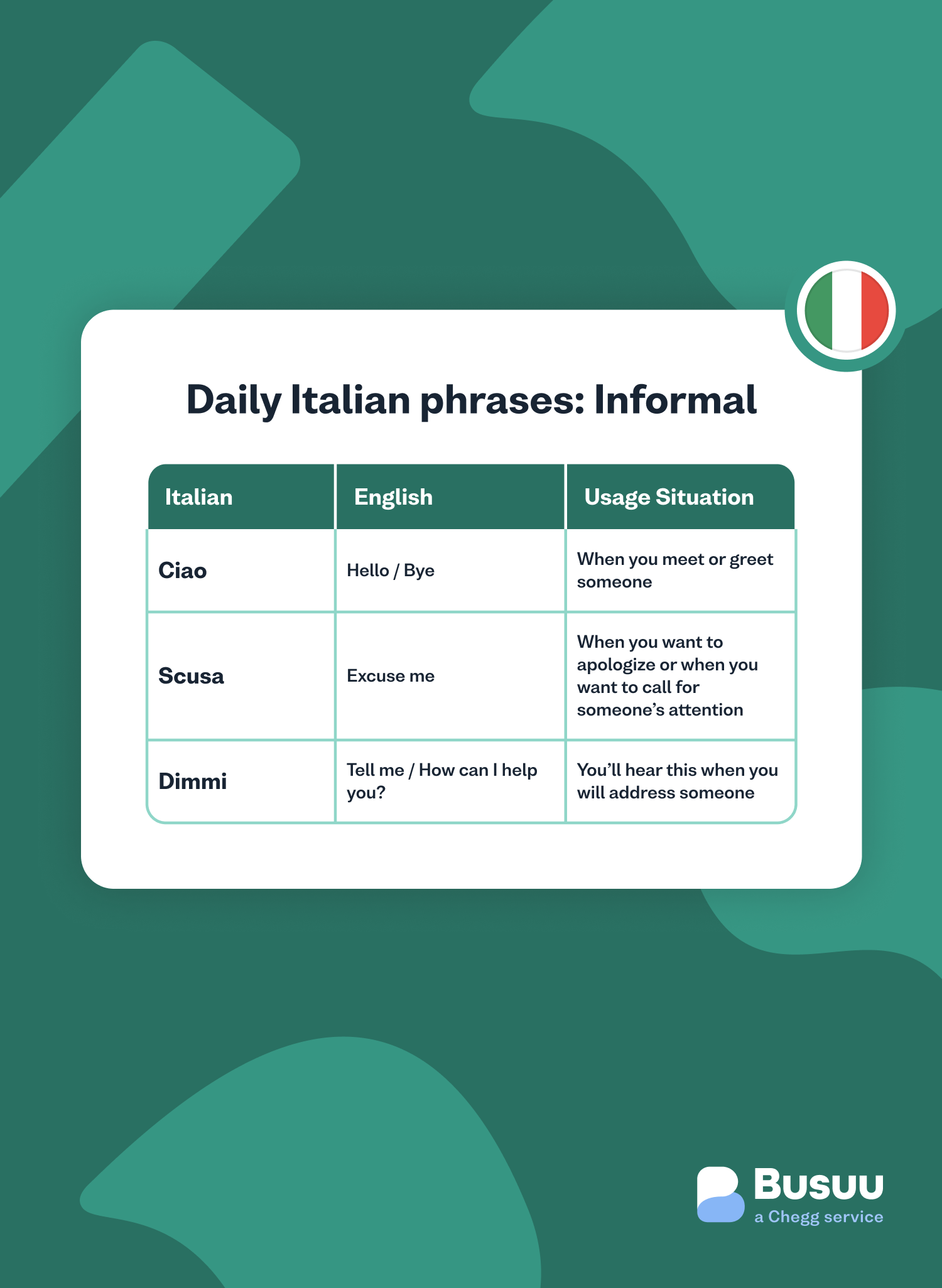
Daily Italian phrases: Informal
| ITALIAN | ENGLISH | SITUATION |
|---|---|---|
| Ciao | When you meet or greet someone | Hello/ Bye |
| Scusa | Excuse me | When you want to apologize or when you want to call for someone’s attention |
| Dimmi | Tell me / How can I help you? | You’ll hear this when you will address someone |
Contrary to popular belief ciao is not used only when you are leaving but also when you are meeting someone. Also, it can be used at any time of the day.
When you need to apologize or call for someone’s attention you will use scusa or the formal scusi.
In the same way, people will address you by saying dimmi or dimmi tutto (tell me everything) when they want to signal that this conversation will be informal.
Here is a quick recap of the formal and informal translation of the same phrase in the table below. (Check out our other article if you want to learn more about greetings in Italian).
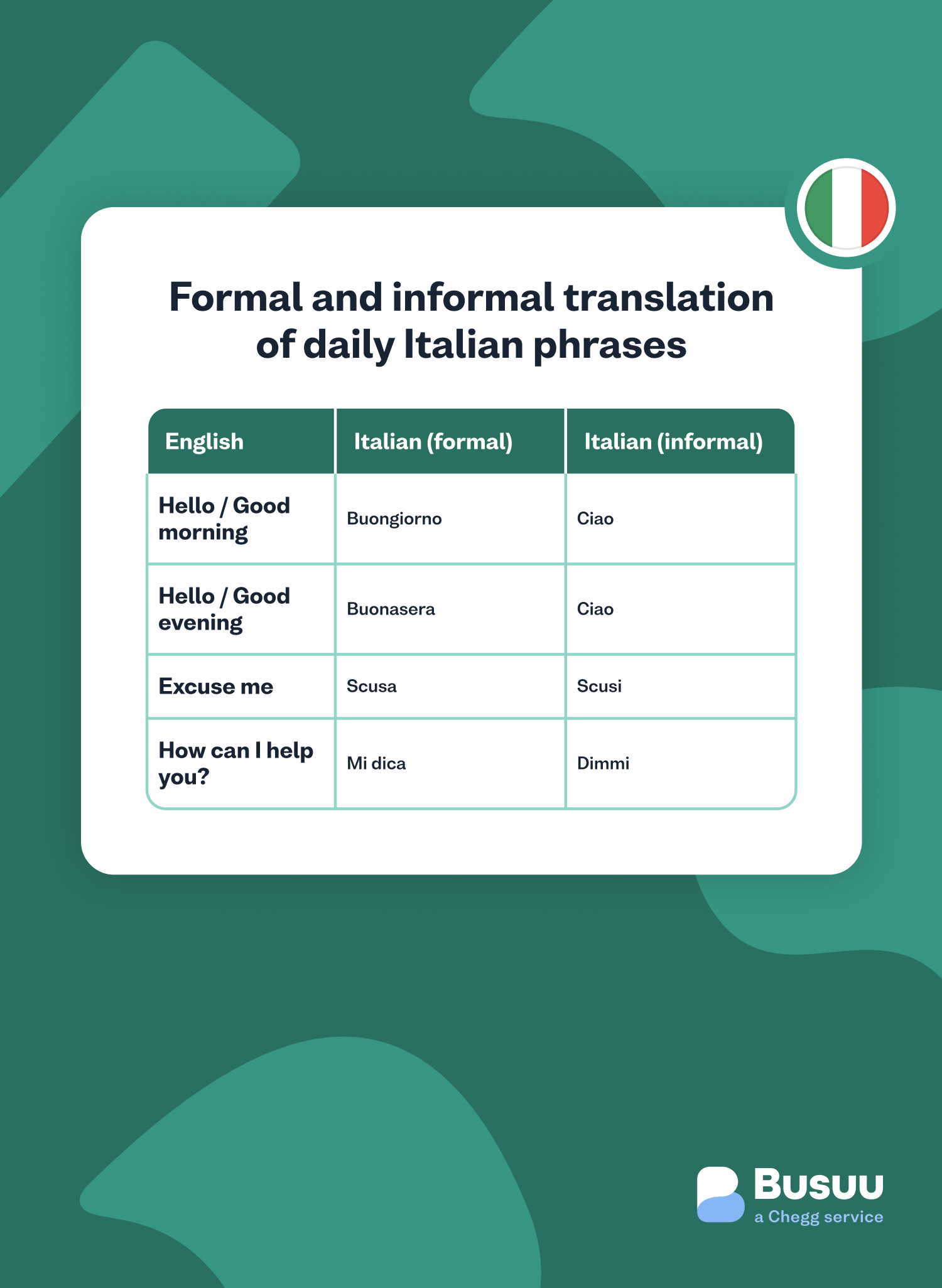
Formal and informal translation of daily Italian phrases
| ENGLISH PHRASE | FORMAL ITALIAN | INFORMAL ITALIAN |
|---|---|---|
| Hello / Good morning | Buongiorno | Ciao |
| Hello / Good evening | Buonasera | Ciao |
| Excuse me | Scusa | Scusi |
| How can I help you? | Mi dica | Dimmi |
Phrases you will need most days
You will often need to ask for directions even if you are probably planning to use your phone for most situations, it will still happen that you will need to address the locals to know where the ticket office, your table or the bathroom are. You won’t find that on the internet. Have these phrases ready in those cases because these will help you understand references to basic information.
Italian phrases for directions, paying and asking for information
| ITALIAN | ENGLISH | SITUATION |
|---|---|---|
| Dove…? | Where…? | Asking for directions |
| Dov’è…? | Where is…? | Asking for directions |
| Quando apre…? | When does… open? | Asking for opening hours |
| Quando chiude…? | When does… close? | Asking for opening hours |
| Siamo in… | We are… | Entering a restaurant, buying tickets |
| Quanto viene? | How much is it? | Asking the price for object or services |
| Quanto costa? | How much it cost? | Asking the price for objects |
| Aperto | Open | Reading information about opening hours |
| Aperto | Open | Reading information about opening hours |
| Chiuso | Close | Reading information about opening hours |
| Entrata | Entrance | In buildings |
| Uscita | Exit | In buildings |
Phrases that just make sense to know
You’ll also need to learn to understand the days of the week. In Italy many services follow a different schedule on different days. Better to be ready.
Days of the week in Italian
| ITALIAN | ENGLISH |
|---|---|
| Lunedì | Monday |
| Martedì | Tuesday |
| Mercoledì | Wednesday |
| Giovedì | Thursday |
| Venerdì | Friday |
| Sabato | Saturday |
| Domenica | Sunday |
| Feriale | Working day |
| Festivo | Bank holiday |
| Pre-festivo | The day before a holiday, usually Saturday |
Remember that pre-festivo is often used in bus or train schedules and that on Saturdays there will be fewer transports available.
When you are asking for a table at a restaurant or buying tickets, you will also need to know a few Italian numbers, so be ready to use these.
Numbers in Italian
| ITALIAN | ENGLISH |
|---|---|
| Uno | One |
| Due | Two |
| Tre | Three |
| Quattro | Four |
| Cinque | Five |
| Sei | Six |
| Sette | Seven |
| Otto | Eight |
| Nove | Nine |
| Dieci | Ten |
When traveling you also need to be ready to understand different moments and times of the day. Remember to use these words when necessary.
Time indicators in Italian
| ITALIAN | ENGLISH |
|---|---|
| Mattina | Morning |
| Pomeriggio | Afternoon |
| Sera | Evening |
| Notte | Night |
| Ieri | Yesterday |
| Oggi | Today |
| Domani | Tomorrow |
| Subito | Right now |
| Fra un po’ | In a while |
You’ll also need to be able not only to use these words but to recognize them. It makes a big difference, to an empty stomach to know if your table will be ready subito or the more generic and often longer fra un po’.
Finally, there are a few words that it’s better to know them and not need them, than to need them and not know them. Here is a quick list that we hope you’ll never need to use.
Emergency words in Italian
| ITALIAN | ENGLISH | SITUATION |
|---|---|---|
| Aiuto! | Help! | Asking for help |
| Attento/Attenta | Careful | When calling someone’s attention to something |
| Sono allergico a… / Sono allergica a… | I am allergic to… | In a restaurant or at the doctor’s |
| Salute! | Bless you! | When someone sneezes |
| Dov’è il bagno? | Where’s the bathroom? | In case you need to use the bathroom |
| Occupato! | Occupied! | In case someone else needs to use the bathroom |
Aiuto is the main cry for help, if you find yourself in any emergency situation, it’s time to shout it out. On the other side of things, if you want to warn someone of something dangerous or that they are about to leave their scarf on the bus, attento is the word for you, attenta if you are talking to a woman.
Italian restaurants and bars are very scrupulous about potentially dangerous foods and by law you will find a detailed list of ingredients in any place that sells food. However it doesn’t hurt to remind people and be extra careful, in that case your phrase is sono allergico (if you’re a man) or sono allergica (if you’re a woman).
When nature is calling there is no time to pull out your phone to do an internet search. Just ask “dov’è il bagno?” to the nearest person and there it is. Speaking of bathrooms, sometimes you’ll have to warn others of your presence. Occupato is the magic word, combined with the appropriate annoyed tone.
Wrapping up
You are now all set with the basic words and phrases in Italian. You know the main greetings in formal and informal situations, and you’ll be able to understand most time-sensitive information, since you know days and numbers that you can use in case of an emergency. However, the learning doesn’t need to stop here.
With Busuu you will find hundreds of free Italian lessons that will help you learn and memorize new words every day. Sign up now and let the learning continue!
Want to learn more Italian words?
Continue learning more words in Italian with Busuu’s free online courses and learning resources designed by language experts. You will be speaking like a Pro and using all these Italian words with ease in no time!
